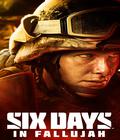The Second Battle for Fallujah began in 2004 after Al Qaeda seized control of one of Iraq’s major cities. The battle proved to be the toughest military conflict for Western forces since 1968.
Lead a fireteam through accurately recreated encounters from the real battle. Each mission is played through the eyes of a real person who narrates what really happened.
Over 100 Marines, Soldiers, and Iraqi civilians who were present during the Second Battle for Fallujah have shared their personal stories, photographs, and video recordings with the development team. The game gives these stories voice through gameplay and first-person accounts captured in original documentary interview footage. Six Days in Fallujah aims to be the most authentic military shooter to date and to tell these military and civilian stories with the integrity they deserve.
Working in partnership with frontline Marines and Soldiers who fought in the Battle for Fallujah, Victura and Highwire have spent more than three years building unique technologies and game mechanics that bring players closer to the uncertainty and tactics of modern combat than other video games have explored.
Atomic Games announced Six Days in Fallujah in 2009, but saw the title abandoned by its original publisher following controversy about the ability of video games to cover challenging real-world events.
Six Days in Fallujah will feature a groundbreaking technology developed by Highwire Games called “Procedural Architecture,” which re-shapes the entire battlefield each time the game is played, assembling entire buildings and city blocks procedurally.
“Marines told us they never knew what was waiting behind the next door,” says Six Days in Fallujah’s creative director, Jaime Griesemer. “But, in video games, we play the same maps over and over again. Just knowing the layout of a building in advance makes playing a combat encounter in a video game very different than actual combat.”
“Memorizing maps is fake. It’s that simple,” says Sgt. Adam Banotai, who led a squad of Marines block-by-block through Fallujah. “Clearing an unfamiliar building or neighborhood is terrifying. You have no idea what’s about to happen, and this is one of the reasons we experienced such high casualties.”
To simulate the uncertainty and danger of urban combat, Highwire Games and Victura invested more than three years building technologies that allow a modern game engine to assemble every room in every building procedurally, along with the dynamic AI and sound systems needed to support game environments that do not remain static.
In Six Days in Fallujah, every map is a new map, so players never know what to expect. While mission objectives and events are consistent with the true stories, every scenario becomes a unique experience each time players restart, ensuring no game ever plays the same way twice.
“With Procedural Architecture, even the game designer doesn’t know what’s about to happen in Six Days in Fallujah,” according to Victura CEO Peter Tamte. “And the best way to overcome this uncertainty is by deploying real military tactics, just like you would if you were really there.”
More details about Six Days in Fallujah will be revealed in the coming weeks, including new technologies that make videogame combat more like the way it was described by those who were there.
Six Days in Fallujah is coming to PC and consoles in 2021.
More articles about Six Days In Fallujah













 Six Days In Fallujah is a first-person tactical military shooter based on true stories from the Second Battle for Fallujah in 2004.
Six Days In Fallujah is a first-person tactical military shooter based on true stories from the Second Battle for Fallujah in 2004.